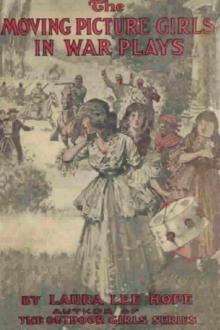An Island Story by H. E. Marshall (ebook pc reader .TXT) 📖

- Author: H. E. Marshall
- Performer: -
Book online «An Island Story by H. E. Marshall (ebook pc reader .TXT) 📖». Author H. E. Marshall
IT is always much more easy to make war than to make peace, and never after any war had Europe been in such a state of turmoil and confusion as it now was. Francis Joseph, the old Emperor of Austria, died during the war. His successor abdicated, and the Empire of Austria fell to pieces. The Emperor of Germany too abdicated, and fled to Holland for refuge, while Germany was given over to revolution. Russia remained in the throes of civil war. Added to this, all the subject nations, which had been held in bondage by Germany, Austria, and Russia, clamored for release.
The Peace Conference, which met at Paris, endeavored to satisfy these subject nations, and to settle the claims of the Allies, and when it had finished its work the map of Europe was changed. New nations had been carved out of Austria and Hungary, Hungary becoming entirely independent, and Austria being made the weakest of central European powers. Turkey was almost wiped from the map of Europe. Poland once again appeared as an independent state. Alsace and Lorraine were given back to France. Besides this restitution to France Germany lost territory to Poland, to Denmark, to Belgium. Of her colonial Empire nothing remained. Italy gained territory to the north and east, and the frontiers of the Balkan states were rearranged. In fact there were only five or six European states whose boundaries remained as they were before the war.
Peace was signed with Germany on the 28th of June 1919, exactly five years after the murder of the heir to the Austrian throne. Two months later peace was signed with Austria. But although peace is signed it will be long, very long before Europe settles to true peace. Civil war still rages in Russia, several other states are still in arms, almost every state which took part in the war is in a state of unrest. Famine and disease, the terrible ghosts of war, still stalk through central Europe; in Austria alone millions of people are starving.
Upon a hundred scattered battle fields millions of gallant men have found a soldier’s grave, thousands more have returned home ruined in mind, body, and estate, broken, maimed, blinded. Thousands upon thousands of children have been made orphans, thousands upon thousands of women are widows.
Have we to fear that all these lives have been given in vain, that all this agony has been suffered in vain? Are we sure that the ends for which the war was fought are won? Has the world been made safe for small nations, are treaties more sacred and more binding than before?
We are not sure but we have a hope. For out of all the blood and agony of the war a great hope for mankind was born. For two thousand years no greater hope than that of the League of Nations has dawned upon the world. It is for you who read this book, you the men and women of the future, to make sure that this new hope is not betrayed.
Very many times throughout the war we heard the words, “this is a war to end war.” But war cannot end war. Only when the will toward peace throughout all the world shall far outweigh the will toward war, can war be ended.
In spite of the terrible lesson of the war the will toward peace is still not very great, but it is greater than it has ever been, and it is for us to labor so that it may grow greater still. Many things work against the will toward peace. In spite of all its horrors there are some people who do not hate war, who even think that war may be a good thing. Others think that war is a bad thing, but taking counsel of despair, they say, “There have always been wars, there always will be wars. It is human nature. So what is the use of trying to stop them?”
At first sight it seems as if there was a good deal to be said for this argument. It does seem as if the love of fighting was born in us. It is nothing unusual for a boy at school to fight. No one is surprised if he comes home with a cut lip or a black eye. Indeed it is taken as a matter of course. It is all part of the game of life, and a boy who can use his fists often gets on very well at school.
But when a boy becomes a man he changes. If he wants to get on well in life he no longer uses his fists but his brains. If in his profession or business he wants to get the better of another man he does not throw off his coat and offer to fight him. He sits down and thinks.
And even as children grow so nations grow. In the early days of our Island Story England was filled with many tribes constantly at war with each other. But as years went on these warring tribes were forced in one way or another to the conclusion, that it was better to join together, and all England in time became one nation acknowledging the rule of one king.
But even after all England acknowledged one ruler there was little peace in the land. For throughout the Middle Ages the turbulent barons claimed the right of private war. Look back to the reign of Stephen and see what the proud barons did in those days. The feudal lord made war when and where he chose, acknowledging no law but his own will. He clung fiercely to this right, and it was only after a long and terrible struggle that the King’s Peace was enforced, and the most unruly baron taught that he could not disturb the general peace, and go unpunished.
All the nations of Europe had to go through a like struggle, but at length within the borders of most states a national peace was established. This was sometimes broken by civil war, but within the borders of a state peace was the rule, war the exception. Without the borders war was unfortunately more often the rule, for men had yet to learn to respect the laws of international right and justice as they had learned to respect those of national right and justice.
Men are only now beginning to see that just as in the old days no baron had the right to break the peace of his country, so now no state has the right to break the peace of the world. And this has led them to the League of Nations.
Very often in the past nations have leagued together. But these leagues have been for war, or have lain under the suspicion that they were meant for war. They were very often too, merely leagues of despotic rulers, who thought of their own ambitions, and not of the good of the people. But the League of Nations is a League of free peoples, and its object is peace.
The idea of a league for peace is no new thing. All through the ages there have been men who not only saw the need of such a league but the possibility of its being formed. But very few people listened to them, for in all nations the will toward war was greater than the will toward peace. But in the years just before the war the multitude of these people had increased very greatly, and societies were formed both in Great Britain and in the United States. But still the people who formed these societies were more or less looked upon as amiable cranks. Their ideas were regarded as Utopian, that is, beautiful but quite impossible.
It was only when the great war came, and brought with it world-wide misery that leaders, rulers, politicians, and people at large awoke to the fact that something must be done to lessen the danger of another catastrophe such as the World War overtaking the world. Then from being the Utopian dream of the few the League of Nations became the great hope of the many. Great soldiers, thinkers, leaders of men, urged its cause, and at length when the Peace Conference met, the Covenant of the League of Nations was framed and embodied in the Peace Treaty with Germany.
The original members of the League of Nations are to be all those nations who were at war with Germany, or who had broken off relations with her. These number thirty-two. Any other state may be elected a member, if it promises to keep the rules laid down by the League, and gives proof that it means to keep that promise. Any state can withdraw from the League if it gives two years’ notice.
All the States belonging to the League agree to meet regularly. There is to be a large assembly of representatives from all the nations and a smaller Council. Besides these regular meetings the League will have a permanent office in Geneva, with a regular staff under a Secretary General, so that there will always be a rallying point for the peoples who seek peace and should any unexpected danger of war arise any member of the League can call a meeting of the Council by applying to the Secretary General. All the members of the League agree to reduce their armaments to the lowest point consistent with national safety. They also agree to tell the other members quite frankly and freely the extent of their preparations for war, and the strength of their army and navy. Above all they agree never to go to war until they have first laid the cause of quarrel before the League, and given the League time to settle it, or try to settle it by peaceful means. If any state disregards this rule, and goes to war without first trying to settle its quarrel by peaceful means, then the whole League will unite against it.
So it would appear that even a league for peace must provide for war. But if the League becomes a living thing, if nearly all the nations in the world join it, the danger of war will be greatly lessened. For a state would hesitate long to go to war if it knew with absolute certainty that thirty or forty other states would immediately rise against it. The League does not hope to abolish war. It cannot abolish war, for as a wise man said four hundred years ago, “It is not possible for all things to be well, unless all men were good; which I think will not be yet in these good many years.”
But the League can make war less probable, and it can arrange that in the future war will never pay. Germany and Austria would never have gone to war in 1914 if they had known with absolute certainty beforehand that all the greatest forces in the world would be against them, because they would have known with equal certainty that they could not win.
So long as war is to be the arbiter between nations men will be forced to fight. Britain could not avoid taking part in the Great War; our men could do no less than fight and die; our women could do no less than cheer them on. Should a like cause arise to-morrow, and the League of Nations remain a mere name, Britain would again be forced to fight. If we are to keep faith with our gallant dead, who gave their lives in





Comments (0)